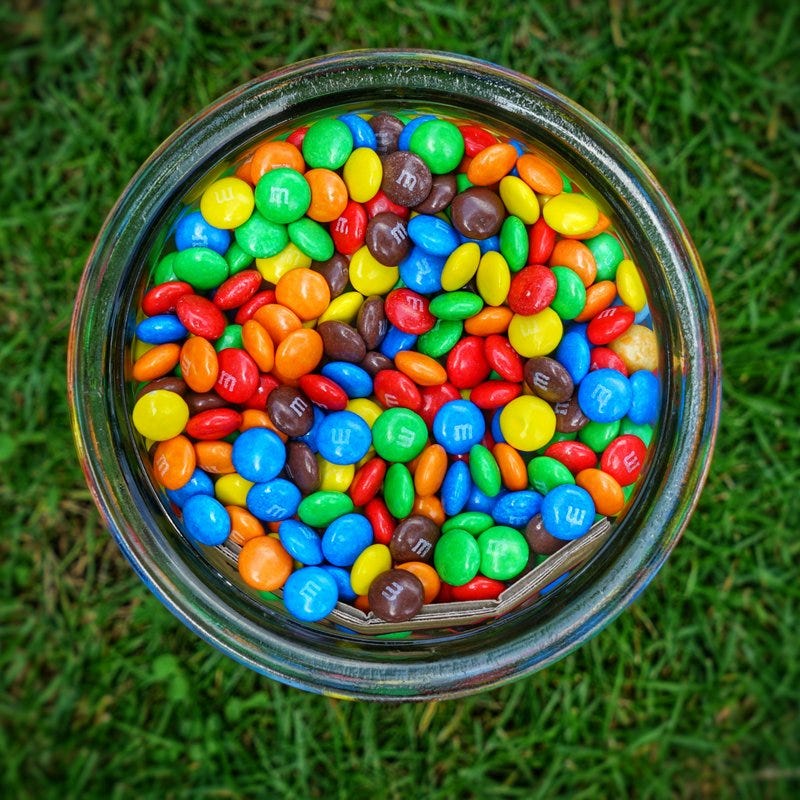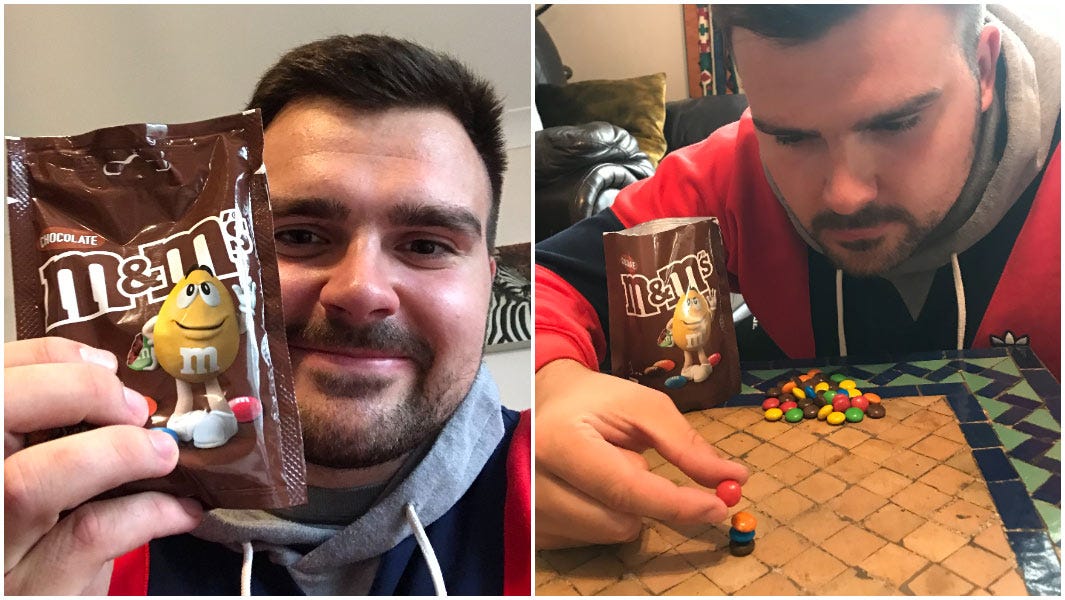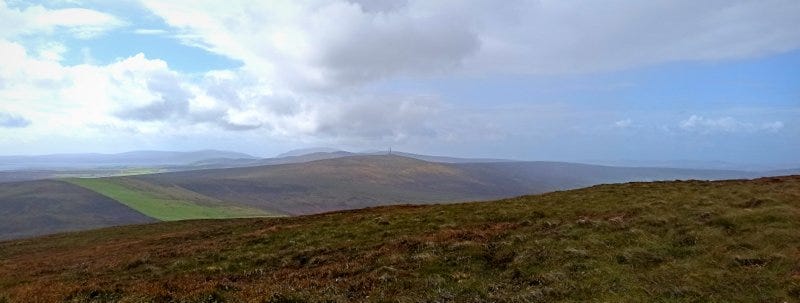Hello! This is Everything Is Amazing, a newsletter about curiosity, attention, wonder and directional oppression.
Today, here’s a short essay I’ve made using my cake-hole, all about Guinness World Records & why they should never get in the way of you having a good time.
TRANSCRIPT:
At the beginning of this year, there was a chap in Solihull, a market town in the West Midlands of England, who found himself at a loose end. So he decided to beat a Guinness World Record.
It was the middle of lockdown, he was sitting in front of the TV, bored out of his mind - we’ve all felt some version of this. It’s why people have been doing lockdown challenges, like climbing their stairs to the equivalent height of Everest, or walking from London to Istanbul, except in their back garden.
But Will Cutbill of Solihull had bigger dreams than most. He’d been looking to score a Guiness World Record all his life. In his own words: “I’ve always wanted one. I’ve bought the books every year and have always dreamed of one day reading my name in it.”
And one day, sat eating M&Ms on his sofa, he found what he was looking for.
The previous world record for stacking M&Ms on top of each other was simultaneously held by Silvio Sabba of Italy, and Brendan Kelbie of Australia. Their towering achievement? Four. A vertical stack of four M&Ms.
But Will dreamed bigger.
How much bigger?
One. One M&M bigger.
On June 4th, Guinness posted the video on Instagram of Will making his successful world-record attempt. This currently has 90,000 views, and featured triumphant orchestral music that wouldn’t sound out of place in a Star Wars movie.
I mean, I’m guessing this isn’t exactly what he sent to Guinness to get it verified. In fact, I have all sorts of questions - doesn’t the shell of the M&M get a bit stickier as it melted, so if you’re handling them for a while, doesn’t it get easier to stick them together? Couldn’t you just cheat by tapping a few of them with a hammer to flatten them slightly? I hope Guinness has thought about all of this properly. (I’m sure they have.)
So, in one sense this is amazing, and in another it’s completely ludicrous. I’m sure you’ve already picked a side on this. But it got me thinking about world records in general.
Who wouldn’t want a world record against their name? You know, becoming universally known as the best at doing something, at least for a while. Like Timur Gareyev, the chessplayer I wrote about back in March, who got the world record for playing 48 games of chess simultaneously, while blindfolded. That’s also what we think of when we hear “Guinness World Record”, an almost superhuman feat of physical or mental skill.
But - is this kind of behaviour, you know, fun?
If your aim in life is to bag Guinness world records, then fair enough. But if your aim in life is to have memorable experiences that make you feel alive, why do you have to do something that nobody has ever done before?
About 20 years ago, I was coming back from working as an archaeologist in Orkney, the scatter of islands off the top of Scotland that looks a bit like someone whacked a cookie with a hammer. And I was disorganised, so I failed to get an advance booking for a bed in the main island’s only youth hostel. When I got there, it was full and I was turned away. My bus that connected with my ferry and train back to England was the next morning.
So I zipped up my raincoat and walked out of the town, Kirkwall. If you’re a gamer and you’ve played the Dragon Age games, yes, Kirkwall is a real place, it’s in Orkney.
So I walked out of town, found a field that wasn’t in sight of any farmhouses, put on all the clothes I was carrying, burrowed into the depths of my jacket and went to sleep. Surprisingly, I was pretty comfy until about 3am, when it started raining. When I finally staggered my way back into town at 6am I was totally wet through and shivering and I couldn’t feel my fingers until I curled them around a hot cup of tea in a cafe that opened at half six.
In a wider sense, I did nothing new. Human beings have been sleeping outside for thousands of years, certainly not all of them willingly. If you want to get philosophical about it, humans always sleep outside, because this thing we call “The Inside” is a human invention. If you’re indoors, you’re still outside, you just have a bunch of bricks and wood and stone around you that makes you feel like you’ve stepped through a gateway into a safer, more controllable universe. It’s a weird thing, if you think about it.
So millions of humans have slept outdoors, and so if I want to compare this experience of mine with anyone else’s, it’s pathetic. But to me, it’s one of the….well, I won’t say best experiences of my life, it was pretty horrible in places, but it’s certainly one of the most memorable. I can remember how it felt when it started raining, and how it felt when that rain reached my underwear. I can remember not being able to walk straight because I was shivering so much.
And I can remember that cup of tea, which was simultaneously just any old cup of tea, and also probably the best one I’ll ever have in my life.
So, that’s a memory of something most of the human race has already done, but since I was the one doing it, it’ll stay with me forever. And this is the thing about curiosity and wonder. When you’re out there doing the thing - climbing a not terribly big mountain, sleeping in a not terribly remote cabin, walking or running a not terribly long way and so on - your mind will not give a damn that lots of other people have done what you’re doing. It won’t care.
This constant pressure to compare what you’re doing with others - your heroes, your enemies, famous people, idiots and so on - it disappears when you’re in the grip of awe, when you’re consumed by fascination, when you’re feeling completely swept away by it all, you do not care if it’s the least original thing in the world.
It’s a bit like reading or watching good fiction: you know the story isn’t real, but do you care when you’re in the middle of it? Researchers have actually taken MRI scans of the brains of people reading fiction, and it seems that the same parts of our brains light up when we’re reading a good story as when we’re having the real-world experience that story is about. The same parts of the brain.
And maybe curiosity’s kinda similar. You can go out and do things that millions of people have already done, and they will still change your life forever. YOUR life. That’s the point.
I mean, the only people who have to worry about novelty, really, are the folk selling their experiences in some way, because publishing demands novelty - you pitch an article, and if you don’t answer the question “What’s special about this?” your story might get ignored. Although, there was a great piece by Leon McCarron I read a while back that was about an absolutely ordinary day he had where nothing special happened. His point being, everything ordinary is amazing if you spend enough time looking at it. Or it feels amazing.
I’d recommend the work of Tristan Gooley on this topic as well. And Rebecca Solnit. Oh - don’t get me started. You’ve had nearly two seasons of me throwing books at you like this.
Anyway. If your takeaway from this particular newsletter is to march to the shop, buy a family-size pack of M & Ms and get to work securing your place in the history books, well, that’s marvellous. Good on you. But if that doesn’t sound like the most fun way to spend your time, please don’t ignore the fun you could be having by doing something that’s mindblowingly unoriginal to everyone except you.
Here’s one of mine: I’ve never been skiing. Never worn skis. Do they go on my feet or on my hands? God knows, I guess I’ll find out at some point. (Maybe the hard way.)
What’s your equivalent of this? Does it look disappointingly ordinary compared to what everyone else is doing? Well, nuts to them. This is you. To you, it’d be an adventure. And that’s what will matter, when you’re doing it.
Thanks for listening.
Images: Robert Anasch, Will Cutbill.











